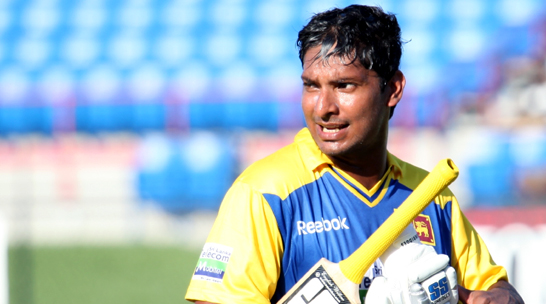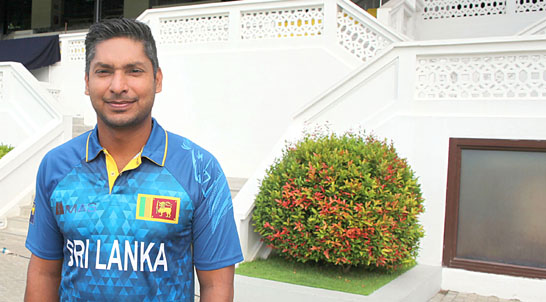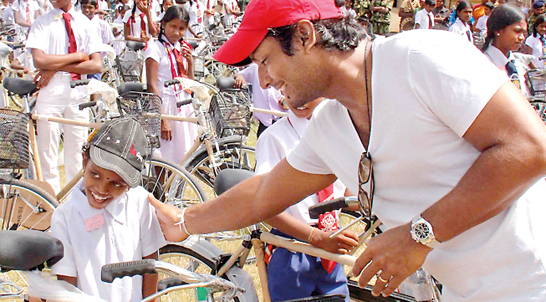Sanga talks about empowering rural Sri Lankans, his big hope for change in cricket structure, emerging talent in the North and East and Sri Lanka’s post-war psyche.
The Sri Lankan icon talked about his charity initiatives empowering rural Sri Lankans, pinning his hopes for Sri Lanka’s cricket future in a provincial structure, saying it was absolutely necessary if the country ever dreams of match winning Test teams. He believes the new provincial system will afford more rural children a chance to play high-level cricket. He also talked about the importance Sri Lanka’s post war psyche, and a continuing struggle to forge a united national identity.
Q: The CIMA Mayor’s Tour to Sri Lanka, comprising of high school children from Toronto will play teams from the Foundation of Goodness and Sri Lankan schools. Also, the team may include some Sri Lankan expatriate children. What are your thoughts on this initiative?
It is a timely initiative in light of Sri Lanka’s present context, many Sri Lankans living outside will find it interesting to come back and really see the country of their parents’ birth. Some of them were born here and moved away at a very young age. They have an opportunity to come back and get in touch with their roots. From a social angle, community relations are important for the long-term future of Sri Lanka. Right now, is the best opportunity to start building an intimate relationship between all Sri Lankans living locally and abroad.
Sport has always been a factor that has united Sri Lanka and again you see in this case, sport is the first point of contact. In June and July when the team arrives from Toronto, I hope that a lot of Sri Lankan expatriate children will be part of the initiative because it is very important for them to see Sri Lanka and to be able to understand where we are as a country, society and also understand how other Sri Lankan children work and think. And find that common ground which eventually builds that lasting relationship for them to come back and see more.
Q: Why do you support the Foundation of Goodness?
Our main objective is to bridge the gap between rural and urban communities in terms of facilities, opportunities, education. We want to ensure the children and the communities we support have a full and complete say in the future of Sri Lanka. For them to have their own place in society to build their lives better, bigger and stronger. I think that is what Sri Lanka needs, whether it is in the South or Central province or the North and East. Every Sri Lankan needs to have opportunity, facilities and the support to ensure them and their children to have a say in Sri Lanka. The Foundation of Goodness is about providing that goal with those facilities.
Q: What are the projects underway?
We have a lot of projects underway. The importance of the Foundation of Goodness is sustainable funding we have support from corporate sector, individuals, both national and international. That enables us to strongly build our support structure. We have had specific projects and various times, if you visit the centre in Seenigama that we have down South there are many facilities ranging from psycho-social support, pharmacy-dentistry, indoor, outdoor sporting facilities, vocational training, computer training and so on in myriad of facilities that are made use of by the communities in and around Seenigama. We are trying to replicate that centre in the North and East.
Sporting Culture emerging in the North East
We have built a very strong sporting culture in the North and East with the Murali Harmony Cup. We had children from the North and East playing the best teams from the rest of the island.
Although the children were cut-off from the rest of the island during the war, but for some reason they are naturally adept at the sport. In the first year of the Murali Harmony Cup, Jaffna beat every other fancied side including my school Trinity College, who were the Under 19 Triple Champs.
Q: When will we see one of these cricketers from the North and East in the national side?
We have had a few national cricketers in the past who were born in Jaffna. When you consider the North and East, the children need exposure and platform to display their skills. They also need to be integrated to our First Class cricketing structure. I don’t think it will happen in one or two years, but I think in the next five years is more realistic to see one or two players from North and East provinces. In the next 10 years we will see a lot more of these players coming…if you have ever seen footage of the Murali Harmony Cup it’s outstanding talent and you can only imagine the future if they have facilities.
Q: Any players that caught your eye?
We have Edward Edding and Rishan Tudor from Jaffna who tried First Class cricket in the rest of the island and they have had limited success. They have had success, but not as much as they would have preferred. It is a long road, and they have gone back and worked with the Murali Harmony Cup. Now they support their hometown and village teams and emerging players that have come from the North and East.
Provincial Structure: It’s an absolutely necessary change
We are still in the process of trying to revamp Sri Lanka’s cricketing structure. Revamping the structure where clubs are clustered and where all provinces have the equal opportunity to contribute players into that First Class structure. That will allow all provinces, districts and towns in Sri Lanka to really have a say and allow all those children to participate in cricket fully. That is something they are trying to set-up right now and if that works…
Q: Do you think it will work?
It has to work if we ever want to think about being world champions again and having consistent Test sides who win both at home and abroad. It’s an absolutely necessary change. If we can push that through, we will have the integration of all provinces.
Q: Is this period a crucial time for Sri Lanka Cricket?
Yes, we have interim committee appointed by the government and sports minister to make those changes. Hopefully they will be able to push that through, which is an absolutely necessary change. It will have the biggest benefit, directly impacting the future of Sri Lanka cricket and also directly impacting children from all over Sri Lanka. That is what I am waiting to see. If that change happens, that 10 year period can be shortened and we can see players from the North and East emerging sooner.
Where a feeling that I am a worthwhile part of a worthwhile journey of a country even if I speak a different language, or my religion is different from the majority; my voice is heard and my contribution is valued equally. I have rights, I have a place, not just for me, but for my children. If that is assured, it is the new conflict, which we are fighting towards in Sri Lanka.
Q: In your 2011 Cowdrey Lecture you spoke about different eras in Sri Lankan history. How important is the current post-war era?
It’s not an end but a beginning of a country. Trying to integrate, to better understand what really unites us.To better understand what place each individual has, rather than an ethnic identity, how can we foster a national identity.
Where a feeling that I am a worthwhile part of a worthwhile journey of a country even if I speak a different language, or my religion is different from the majority; my voice is heard and my contribution is valued equally. I have rights, I have a place, not just for me, but for my children. If that is assured, it is the new conflict, which we are fighting towards in Sri Lanka.
Politics aside, Sri Lankans need to make physiological adjustment. We have to look at ourselves a bit more and also understand that we contribute to mutual understanding or mutual misunderstanding. And ensure what we do and say is all about leaving no room for conflict, but there is only room for a journey forward where everyone sits and stands very strongly together.

“Politics aside, Sri Lankans need to make physiological adjustment,” says Sangakkara. (File Picture by Mahesh Abeyewardene)
Q: What roles do Sri Lankans abroad have?
Any Sri Lankan anywhere has a role to play. It doesn’t have to be big or minuet. Be able to be proud that you are Sinhalese, Tamil or Buddhist, Hindu, Christian or Muslim.
You need to say that with pride, but also not state in an exclusive or discriminatory way.
Even if you live in another country, you are not isolated from the Sri Lankan experience; you are Sri Lankan at some point in your life through some connection.
You have a yearning to come back and see or you have a yearning to see how you can help; the avenues are open, the opportunities are there and you must be open to be available in any way.
Maybe it’s the way you speak to your friends about different peoples of Sri Lanka, maybe it’s with negativity from 10 years ago and now filled with joy. Subtle changes can go a long away.


